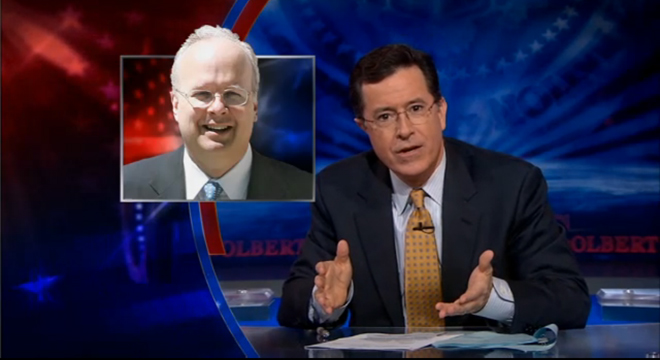The Federal Election Commission is supposed to rule this week on an issue Stephen Colbert has given a lot of attention: a request from Karl Rove’s American Crossroads “super PAC” to let groups like theirs coordinate filming “uncoordinated” advertisements with federal candidates.
Last week, the FEC posted four draft responses to the request for an advisory opinion. That means there’s a strong possibility that the FEC wouldn’t give any advice on the topic because they can’t get four votes for any of the drafts. But just in case they do, here’s how each finding would break down.
Draft A: Just because a candidate appears in an advertisement doesn’t necessarily mean that the ad would qualify as a “coordinated communication,” the FEC would find. The ad American Crossroads proposed, however, would because “the opinions of the candidate’s opponents are criticized.” Under this opinion, the FEC would rule that advertisements featuring a candidate criticizing his opponent (but not using the word “candidate” or “opponent”) are “the functional equivalent of express advocacy.” That doesn’t mean that future ads would automatically be considered coordinated, only if American Crossroads “uses information obtained during those prior discussions in its subsequent advertisement.”
Draft B (pg. 22): Like draft A, draft B would find that candidates could appear in advertisements without them being considered “coordinated.” But unlike draft A, the sample ad developed by American Crossroads which features a candidate criticizing his opponent would be allowed because the FEC would conclude “that the Type 2 advertisement does not expressly advocate the election or defeat of a clearly identified candidate for Federal office.” It isn’t the functional equivalent of express advocacy, the FEC would rule, “because it is susceptible of a reasonable interpretation other than as an appeal to vote for or against a specific candidate.”
Draft C (pg. 42) Same basic findings as draft B, but draft C goes a bit further in warning that advertisements which take place after a candidate has coordinated a commercial with a super PAC may be considered coordinated communications. “The specific information conveyed from the candidate to American Crossroads in the course of their prior discussions – in certain circumstances – could result in the communication meeting one of the five conduct standards,” according to the draft report. “But the mere fact that the candidate had prior discussions and coordinated with American Crossroads on its previous advertisements would not by itself automatically render subsequent communications coordinated. Rather, the facts regarding each communication would need to be considered to determine if a particular communication met the conduct prong.” If the campaign shares “plans, projects, activities, or needs” with the person making the communication, this draft report warns that could cause some problems.
Draft D (pg. 61) This is the only draft which rejects the request from American Crossroads to feature candidates in their non-coordinated advertisements. It would find that an advertisement “intended to improve the public’s perception of a candidate for Congress in the upcoming Federal election, which is paid for by a person other than the candidate or the candidate’s authorized committee and both features and is otherwise fully coordinated with the candidate (with or without reference to the candidate’s opponent[s], would constitute an in-kind contribution to the candidate.”






